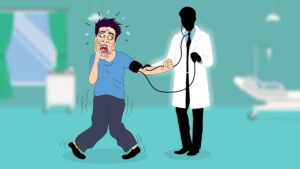
What are the Causes and Symptoms of Atrial fibrillation (AFib)
Atrial fibrillation (AFib) is a common and yet under-recognized cardiac problem. Since many people may have only episodes of AF, they may not even seek medical attention for the condition. However, some studies in India suggest that its prevalence is much higher in adults older than 40 years of age than thought earlier.
It may have a varied presentation, as in some it is proximal, that comes and goes within 48 hours, persistent, that lasts more than 7 days or even permanent. Individuals with long-standing AF (more than a year) are more likely to seek medical attention.
Atrial Fibrillation Symptoms
In AF, there is shivering of the upper chamber of the heart, and it beats irregularly. However, since the rhythm of the lower chambers (ventricles) is more or less preserved, its symptoms are less acute. Unfortunately, that is why many people may fail to identify the issue.
Perhaps the most significant symptom of AF would be that individuals would feel something different in the chest, along with palpitation. This is because the upper chambers are not following the rhythm of the lower chambers of the heart.
Some of the common AFib symptoms are:
- Palpitation
- Feeling of fluttering in the chest
- Fatigue
- Irregular heartbeat
- Dizziness
- Anxiety and shortness of breath
- Weakness
- Faintness and confusion
- Fatigue on the mild exercise of physical exertion
- Sweating
- Pain or feeling of discomfort in the chest. Severe chest pain is a red flag and may indicate a heart attack.
Atrial Fibrillation Causes
Science has poor understanding about the causes of AF. Moreover, it appears that its cause would differ among various individuals. Nonetheless, some conditions are more commonly associated with AF.
Thus, those who had a heart attack or stroke in the past are at a greater risk of developing AF. It is because, in them, specific heart structures are already affected.
It is more common in people with coronary artery diseases, blocked arteries, hypertension, heart valve defects, lung diseases.
Emotional stress may also cause AF. Similarly, physical stress like surgery, pneumonia, or other illnesses may cause AF. Poor sleep quality may cause AF or maybe even a sign of an unidentified problem.
Hormonal issues are also the cause of AF, especially thyroid disease, as it causes widespread metabolic imbalances.
Finally, it is worth noticing that substance abuse like alcohol, tobacco, caffeine may cause AF.
Risk factors for AFib
Certain individuals are at the greater risk of AF:
- Older adults: AF is more commonly diagnosed in adults older than 40 years. However, it may sometimes be identified in young adults, like those living with some cardiovascular defects.
- Ethnicity: It is vital to understand that South Asians are most prone to cardiovascular disorders globally. It means that in Indians, even heart attacks at the young age of 30 are increasing. Thus, a higher risk of AF.
- High blood pressure: As more than 10% of adults have high blood pressure, it is a considerable risk factor. High blood pressure causes changes in hemodynamics, puts unusually high pressure on the heart.
- Thyroid disease: it may trigger arrhythmias.
- Chronic disorders: AF is more common in those living with diabetes, kidney disease, lung disorders, and sleep issues.
- Alcohol consumption.
- Obesity.
- Family history.
Complications of AFib
AF considerably increases the risk of stroke and heart attack. For example, the risk of stroke in those living with AF is four to five times higher.
It happens because atrial flutter causes abnormal blood movements in the upper heart chamber (atria), pooling of blood, and even sometimes backflow of the blood. As a result, it may cause the formation of clots that may travel to the brain and cause embolic stroke or heart attack.
It may also lead to heart failure, a more chronic condition in which the heart fails to pump enough blood, thus causing severe fatigue, shortness of breath, swellings, accumulation of fluid in the lungs.
Prevention of AFib
Fortunately, early diagnosis of atrial fibrillation will help to prevent it in many cases. Moreover, in many individuals, it is not permanent, and they only have episodes of AF. However, preventing AF in permanent cases without medications may be challenging.
For most individuals, lifestyle interventions would help. Thus, giving up smoking and alcohol consumption is a must. In addition, one should consume more fruits and vegetables.
In the Indian context, it may be vital to switch to healthy fats. It may mean reducing the consumption of vegetable oils. Most vegetable oils are rich in inflammation-causing omega-6 but low in omega-3 fatty acids. Rich sources of omega-3 could be olive oil, walnuts, other nuts, and seeds.
Another vital thing is to engage in moderately intense physical activity for at least 30 minutes and five times a week. Walking does not qualify as moderate-intensity exercise. Jogging, swimming, playing badminton may help better. Slowly increasing physical activity (depending on the age and health condition) to 60 minutes a day and five times a week is ideal.
Nowadays there are blood pressure monitors available in the market which can detect AF also.













